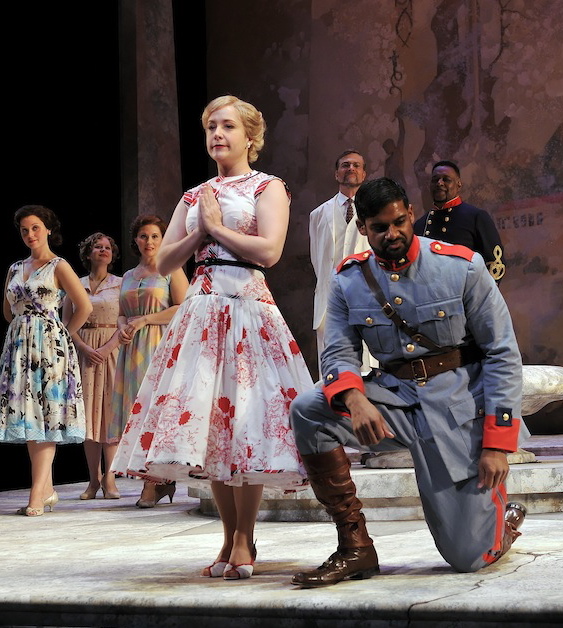Opera Boston serves up a breezy and delightful “Beatrice et Benedict”

Julie Boulianne and Sean Panikkar star in Opera Boston's "Beatrice et Benedict." Photo: Clive Grainger
In less than a decade, Opera Boston has created a successful brand with innovative repertory choices and strong casting. Under artistic director Gil Rose, the troupe has not only commissioned works (Zhou Long’s Pulitzer Prize-winning Madame White Snake), but staged “never-heard-that before” operas like Hindemith’s Cardillac and Offenbach’s Grande Duchesse de Gerolstein.
Opera Boston opened its season with Berlioz’s Béatrice et Bénédict Friday evening at the Cutler Majestic Theatre, and while expectations were high, they were met across the board in a thoroughly engaging performance.
Works from the French opéra comique tradition—musical passages interspersed with spoken dialogue—are rarely staged. Béatrice et Bénédict—a highly condensed adaptation of Shakespeare’s Much Ado About Nothing—tells the story of two sparring romantic adversaries who end up in love with the help of their plotting friends. The comedy is sparkling but subtle; the music, consistently stylish and often sublime.
Rose has used star power (Stephanie Blythe, Ewa Podlès) in the past to generate buzz. For this cast he chose an ensemble with less name caché, but plenty of talent. Tenor Sean Panikkar and mezzo Julie Boulianne sang the title roles, and both young artists proved charismatic vocally and visually.
Panikkar’s flexible lyric tenor dealt ably with the wide-ranging role–Me marier in particular— and acted with style. Boulianne has a darkness to her tone that suited her “marriage is not for me” attitude, and her singing and onstage demeanor were engaging throughout.
The reluctant lovers are juxtaposed by their betrothed friends, Héro (sung beautifully by soprano Heather Buck) and Claudio (baritone David McFerrin). Buck’s expressive Je vais le voir provided a highlight of the evening.
The remaining major roles were taken by mezzo Kelley O’Connor, as Héro’s confidante Ursule, and bass Andrew Funk, as the hapless composer Somarone. The entire cast presented an enviable blend of voices, appropriate to the score’s multiple duets and trios. The duet by Buck and O’Connor that closes Act I, Nuit paisible et sereine, was rendered with touching tranquility, with Rose lingering over the pizzicato strings in the pit.
The ensemble had its share of highlights, with Funk comically conducting a preposterous marriage tribute in Act 1, and then leading the chorus and onstage banda in a loutish drinking song, Le vin de Syracuse, to open Act 2.
Director David Kneuss imaginatively updated the action to a post-WWII milieu. While the sets—alternating between a courtyard and a seaside vista—were unremarkable, the clever costuming with men in military dress and the women in summer dresses was a treat. Kneuss’s opted for presenting the spoken dialogue in English, which helped put across the comedy, though the extended speaking parts could have been trimmed.
Berlioz’s effervescent score is demanding, and, from the celebrated bravura overture forward, Rose led a consistently strong, virtuosic performance in the pit.
Opera Boston’s Béatrice et Bénédict repeats 3 p.m. Sunday and 7:30 p.m. Tuesday. operaboston.org; 617-451-9944.